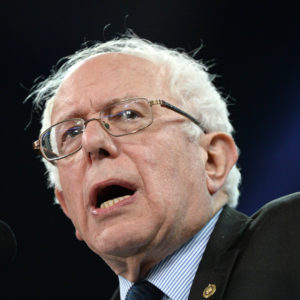Editor’s Note: For an alternative viewpoint, please see CounterPoint:Bernie Sanders, Anti-Imperialism, and Venezuela
Self-described socialists have a long and sordid history of excusing dictators, tyrants and despots who also claim to be socialists — regardless of their atrocities. And the latest example of this troubling tendency is democratic socialist Bernie Sanders. Will Democrats ignore Sanders’ reluctance to condemn Venezuela’s socialism — or reject him?
Florida Democrats may take the latter approach.
Politico reported last February, “Florida Democrats are denouncing Democratic presidential candidate Bernie Sanders for refusing to call Venezuelan strongman Nicolas Maduro a dictator.” The best Sanders could offer up at the time was, “I think clearly he has been very, very abusive.”
Florida is no breeding ground for socialist sentiment — as opposed to, say, Vermont, California or New York — since the state is replete with Cuban and Venezuelan expats and their descendants who have actually lived under socialism.
But Sanders’ reluctance to denounce authoritarian socialists, both now and in the past, is characteristic of the widespread speak-no-ill-of-socialists mentality.
When socialism was growing in popularity in the 1930s, the leading leftist journal of opinion, The New Republic, repeatedly excused and defended Joseph Stalin and his tactics.
In the midst of Stalin’s show trials and mass executions, the editors claimed he represented “the new society … and (a) promise of the future.” But when excusing Stalin’s heinous crimes became indefensible, The New Republic recanted.
More recently, New York Times columnist Bret Stephens wrote that actors Sean Penn and Danny Glover once “cheered” the Venezuelan regime. Stephens implies they have lately gone silent — but not critical.
And filmmaker Michael Moore ended his film “Sicko” by visiting Cuba, where he gushed over the socialist island’s healthcare system — while ignoring its rampant poverty, lack of civil liberties, and jails full of political prisoners.
Sanders apparently realizes he could alienate many Democrats who proudly hold center-left positions but think full-fledged socialism is still a bridge too far. Thus, in a recent speech he stressed that he’s a “democratic socialist,” call it a “kinder, gentler” socialism where the voters’ choices are respected.
But remember that Venezuelans elected Hugo Chavez president — three times. Once authoritarians have consolidated power and filled the government with cronies, elections are only about maintaining a veneer of legitimacy.
In his speech, Sanders implied that he’s building on the liberal legacies of presidents Franklin D. Roosevelt and Lyndon Johnson. But when listing the ways he believes the United States has failed the poor and middle class, Sanders sounds like every socialist demagogue, including Chavez and Maduro.
And Sanders’ proposed solutions are also the same: expand government control over every aspect of life and force massive wealth redistribution.
Will Democrats buy the “democratic socialist” distinction? That depends on whether the core of the party is still squarely center-left or if a critical mass now embraces socialism — in theory if not yet in practice. Last year a Gallup poll found that 57 percent of Democrats have a favorable view of socialism.
A plurality of Democrats currently support Joe Biden over Sanders by a wide margin, which may indicate Democrats are not yet ready to vote for a democratic socialist — or at least not for one so open about it. If so, Sanders may have to make a clean break with socialists like Maduro.
In the 2008 presidential election, Barack Obama equivocated for months before denouncing his pastor and “spiritual guide” of nearly 20 years, the Rev. Jeremiah Wright, because of several anti-American statements. It wasn’t something Obama wanted to do, but he felt he had to in order to save his campaign.
Sanders may reluctantly come to the same conclusion and denounce Maduro and his ilk for the sake of his campaign, but that denunciation would be based on political expediency, not political principle.

